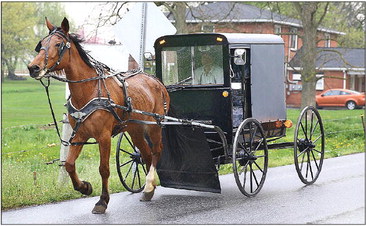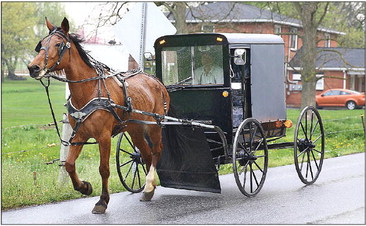Clark Co. board supports buggy registration


The Clark County Board of Supervisors went on record recently in support of proposed state legislation that would allow counties to adopt ordinances requiring registration of animal-drawn vehicles that use their roads.
If enacted by the state legislature, the proposed bill would allow for an annual maximum registration fee of $100 on all horse-drawn vehicles that are “used primarily for transportation purposes.”
Meeting in Neillsville on Feb. 19, supervisors voted 23-3 in favor of Assembly Bill 612 and mailing a copy of its action to the governor and area legislators. Voting against the action were supervisors Kevin Flink of Abbotsford, Noel Olson of Neillsville and Dan Clough of Neillsville.
Assembly Bill 612 was introduced in the legislature in November 2019 by 10 state representatives, including 69th District Assemblyman Bob Kulp (R-Stratford). It notes that current laws allow municipalities to collect registration fees on motorized vehicles weighing less than 8,000 pounds.
The new bill would extend registration fee authority to counties, for horsedrawn vehicles that are “customarily” kept in the county. The bill would require the county to pay 50 percent of any registration fee collected to the township where the vehicle is kept. The registration fee revenue, the bill states, could be used only for transportation-related purposes or for administrative costs related to the fee collection.
The board passed the resolution with little discussion, although Sheriff Scott Haines was asked if the legislation would assist law enforcement. He said it would, as officers who now stop a buggy for a possible violation, such as insuffi cient lighting at night, have no way to know who the operator is, as owners do not have driver’s licenses. Having a registration number assigned to a buggy or other vehicle would give officers some proof of identification.
“We have no way of knowing if the information they’re providing (is correct),” Haines said. The bill was referred to the Assembly Committee on Local Government in November. Kulp offered an amendment to it last month that would require that “proof of registration be displayed on or carried with the vehicle.” The amendment also included language to specify that it would not be required to register an animal-drawn vehicle “that is used solely for recreational purposes, including use in a parade, or that is an implement of husbandry.”
The bill has been endorsed by the Wisconsin Counties Association and the Wisconsin Towns Association.
In other action at its Feb. 19 meeting, the board passed a resolution on a 26-0 vote to request that the state Department of Natural Resources not relocate problem wolves in the county. The resolution makes note of the recent rise in gray wolf populations in the state and asks that any wolves moved from locations where they are causing livestock depradation problems not be brought here.
Clark County has the fifth largest county forest in the state, at more than 134,000 acres, which might make it an attractive location for the DNR to release wolves it has captured elsewhere. However, the resolution notes that the county forest is also bordered in many places by farms, and that could lead to problems.
The resolution reads, “Clark County is concerned that the relocation of problem wolves in the county would significantly impact recreational opportunities and agricultural operations.”
In 2010, the board passed a resolution encouraging the federal government to remove the gray wolf from the endangered species list, so management techniques could be used to control their populations. That resolution said the county supported a population goal of 350 wolves in the state, but the resolution passed last week says that population has swelled to 950 animals.
In other action, the board voted 26-0 in favor of buying a 1.5-acre parcel of land adjacent to the county highway shop/garage in Neillsville. The parcel has older buildings on it now, and those would be removed. An environmental assessment of the removal work still has to be completed, and the land purchase is contingent on no major problems being discovered.
The purchase price for the parcel is $45,000, and the environmental assessment is expected to cost another $17,000. If the buildings were to be removed, highway commissioner Brian Duell said that work is estimated at an additional $80,000.
Duell said the long-term plans for the parcel may include eventual replacement of the current facilities. The main garage was built in 1940, and a secondary storage building dates back to 1925.
“At some point, we have to address our space needs,” Duell said.
The board also heard a presentation on possible establishment of a drug treatment court in the county. It would provide the judicial system with an alternative means of dealing with habitual drug offenders, without incarcerating them.
In other counties, the system has been successful in teaching drug users new skills to allow them to function in society with a reduced threat of returning to the court system for help.

